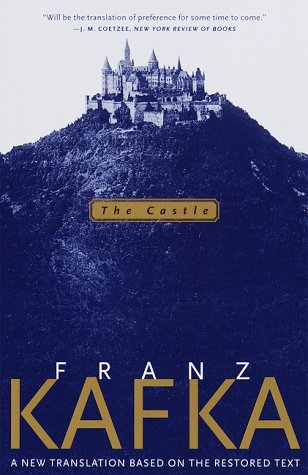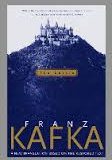The Castle – Franz Kafka – 1926
Reviewed by: Michael Sympson Date: 2 September 2001
Somebody told me that I use to refer to Kafka in almost every other review. How is it, that Kafka has become so pervasive over the years? Although I was personally involved in the early stages of the critical edition of Kafka’s “Castle” and picked up on my German from his “Trial” and although I actually did read every single line that Kafka had ever had put to paper, Kafka did not become my obsession. However I learned to appreciate Kafka as a great and consummate artist, worth reading over and again.
 In the era of Stalin and McCarthy and after the horrors of the death-camps it had became fashionable to read into Kafka’s novels a brooding indictment against oppression and persecution. with metaphysical overtones. Especially in respect to the “Castle,” Max Brod’s editing seemed to suggest a kind of “Pilgrim’s Progress.” W.H. Auden in ‘The Dyer’s Hand’ suggested the opposite, that the castle, far from being a place of redemption, appears to be the nesting place for a bunch of Gnostic demons. Instead of salvaging his own work, Max Brod had saved the manuscripts of his friend and this shall not be forgotten. I also have great respect for Auden, but here as always with Kafka, I advise against fetching too far. For starters: The “Castle” even more than the “Trial” is an unfinished fragment in which the order of the chapters is still a matter of debate and differs considerably from Max Brod’s first edition of the text. But it is his editing which introduced an interpretative bias that played into the hands of Sartre’s bogus-philosophy and turned Kafka the writer into a sort of latter day saint. On the other hand it is a little known fact, that Kafka was an activist in the socialist movements of his period. This should give us a clue when we read in the Trial how the meek people judge the well turned, well connected, and completely self-centred Joseph K.
In the era of Stalin and McCarthy and after the horrors of the death-camps it had became fashionable to read into Kafka’s novels a brooding indictment against oppression and persecution. with metaphysical overtones. Especially in respect to the “Castle,” Max Brod’s editing seemed to suggest a kind of “Pilgrim’s Progress.” W.H. Auden in ‘The Dyer’s Hand’ suggested the opposite, that the castle, far from being a place of redemption, appears to be the nesting place for a bunch of Gnostic demons. Instead of salvaging his own work, Max Brod had saved the manuscripts of his friend and this shall not be forgotten. I also have great respect for Auden, but here as always with Kafka, I advise against fetching too far. For starters: The “Castle” even more than the “Trial” is an unfinished fragment in which the order of the chapters is still a matter of debate and differs considerably from Max Brod’s first edition of the text. But it is his editing which introduced an interpretative bias that played into the hands of Sartre’s bogus-philosophy and turned Kafka the writer into a sort of latter day saint. On the other hand it is a little known fact, that Kafka was an activist in the socialist movements of his period. This should give us a clue when we read in the Trial how the meek people judge the well turned, well connected, and completely self-centred Joseph K.
When I read the “Castle” for the first time, I noticed of course the indifference of the Castle’s staff to the protagonist’s antics. From the outset it is a struggle just to get their attention. I also noticed that “K.” the surveyor, is a con-man, a trickster who tries to wheedle his way into a community that has no need for a surveyor. So when the people in the castle unexpectedly honor his charade and even provide him with 2 assistants, they actually give him a chance. But “K.” doesn’t see this as an opportunity. He is too self-centred – a typical trait for protagonists in a story by Kafka. So he starts an affair with the mistress of an official from the castle, only later to jilt her and start another affair, all of which is Kafka’s very characteristic brew of illicit sex and dingy circumstances.
Kafka’s period as a writer was at the height of the last great art-movement in our Western civilization. And even so I am somewhat bewildered over James Joyce (see my review on Ulysses,) this does not prevent me from acknowledging him as an honest and very innovative artist. But it is the lesser talented and stylistically rather conservative Kafka who actually managed to introduce something radically new, a different kind of story, a new perspective. After Kafka, literature could never be the same. Kafka himself looked back on a literature under the influence of French symbolism. It is one of the many little features hidden under a deceptively simple surface, that the novel’s protagonist is not just a character, a very well developed character, as it should be, but also a cipher for something else. The “Castle’s” community has obviously little need for a surveyor, what need in modern society is left for art and artists? Is there anything that would justify preferred treatment in a changing society? The ringmaster’s care for the fragile performer moves the spectator to tears; the hunger-artist dies of hunger in a cage, barely noticed by anyone; the trapeze-artist instead of fearing heights and loneliness would rather stay up high forever; “K” the surveyor who has nothing to survey didn’t get very far to change his life, because the author never finished the book. It is left to the thoughtful reader to find out, whether there was any way to bring the “Castle” to a conclusion. Maybe Kafka had abandoned it for a reason?















